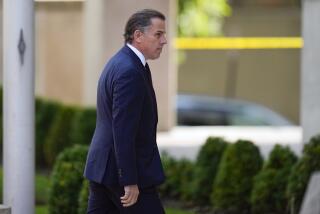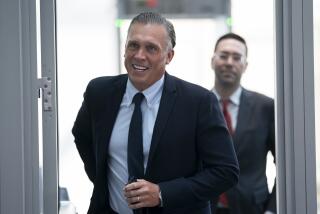Ex-Enron CEO Agrees to Testify Before Panel
- Share via
WASHINGTON — Jeffrey K. Skilling, who unexpectedly quit as Enron Corp. chief executive in August, has agreed to testify next week before Congress, a Senate subcommittee chairman said Thursday.
Congressional investigators are eager to hear from Skilling, who has denied any wrongdoing in the events leading to the energy company’s Chapter 11 bankruptcy filing Dec. 2.
But another Enron executive, Sherron S. Watkins, wrote to Enron Chairman Kenneth L. Lay in August that Skilling had been warned about the company’s problems by other executives, including former Vice Chairman J. Clifford Baxter, who died last week in an apparent suicide.
“Skilling is critical,” said Sen. Byron L. Dorgan (D-N.D.), who chairs the Senate Commerce Committee’s subcommittee on consumer affairs.
The committee also has asked for the testimony of fired Enron Chief Financial Officer Andrew S. Fastow, who allegedly set up many of the off-the-books partnerships that were instrumental in the company’s collapse. Fastow has not responded to the committee, Dorgan said.
A spokeswoman for Skilling confirmed that he had agreed to testify voluntarily and would do so without a grant of immunity.
“He wants to be open and forthcoming with all committees investigating this matter,” Judy Leon said.
Exactly when and where Skilling will testify next week is unclear. He is listed as a witness at a House Energy and Commerce Committee hearing Thursday. Dorgan’s committee and others among the dozen congressional panels investigating the Enron collapse also are seeking his testimony.
“There are competing invitations, and that is complicating the scheduling,” Leon said.
Lay, who replaced Skilling as chief executive and was ousted from that position last week, is scheduled to testify before Dorgan’s committee Monday.
Dorgan said both men are likely to say Enron’s collapse was due to circumstances beyond their control, but that his panel was prepared to counter such claims with internal documents showing that Enron’s board of directors knew about the partnerships.
“It’s sufficient to say that the board of directors discussed on various occasions the creation of partnerships, the structure of the business deals,” Dorgan said.
In other developments, Rep. George Miller (D-Martinez) called on House Speaker J. Dennis Hastert (R-Ill.) to be the “gatekeeper” in determining whether immunity is granted to witnesses in the Enron investigation and what documents are made public.
Complaining about leaks of documents that damaged other cases, Miller wrote Hastert: “The failure to honor confidentiality, the untimely release of information or the inappropriate granting of immunity all have great potential to compromise and undermine [potential] criminal prosecutions of Enron and [accounting firm] Arthur Andersen.”
Sen. Barbara Boxer (D-Calif.) called on the Federal Energy Regulatory Commission to provide her with a list of all meetings and phone calls that took place between Enron executives and FERC commissioners.
“Every day more and more alarming information is revealed concerning Enron’s role in prolonging the California electricity crisis,” she said in a letter to FERC Chairman Patrick H. Wood III.
The FERC said this week that it would investigate allegations that Enron used its market clout to artificially inflate long-term electricity prices on the West Coast. On Thursday, at a FERC-sponsored conference in New York on power supplies in the Northeast, Wood told Reuters news service that its inquiry had begun.
In a letter to Wood on Thursday, Gov. Gray Davis urged FERC to expedite the inquiry and expand it to include other energy marketers.
“California has a special interest in getting to the bottom of such charges, since this state bore the brunt of the marketers’ price gouging,” Davis wrote.
More to Read
Inside the business of entertainment
The Wide Shot brings you news, analysis and insights on everything from streaming wars to production — and what it all means for the future.
You may occasionally receive promotional content from the Los Angeles Times.










